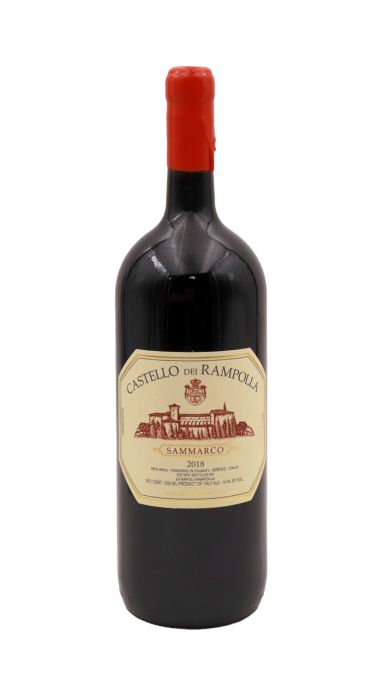Need Help Finding the right wine?
Your personal wine consultant will assist you with buying, managing your collection, investing in wine, entertaining and more.
By continuing, you agree to our privacy policy, consent to cookies, and confirm you are 21 or older.
I have read and agree to the Privacy Policy and Terms of Service.
YOU MUST BE 21 OR OLDER TO CONTINUE
NYC, Long Island and The Hamptons Receive Free Delivery on Orders $300+
Checkout using your account
Checkout as a new customer
Creating an account has many benefits:

2018 Castello dei Rampolla Sammarco
98 VM
| Type of Wine | Italy Red |
|---|---|
| Varietal |
Proprietary Blend
: Proprietary Blend is a general term used to indicate that a wine is comprised of multiple grape varietals which are either “proprietary” to the winery or is blended and does not meet the required maximum or minimum percentage of a particular varietal. This also is the case for the grape’s place of origin, especially for region, appellation or vineyard designated wines. There are endless examples of blended wines which are labeled as “Proprietary Blend” and in conjunction with each region’s stipulated wine laws and regulations makes for a vast blanket for wines to fall into. Perhaps the simplest example is California; if a wine is to be labeled as Napa Valley Cabernet Sauvignon, it is required to have at least 75% of the varietal (Cabernet Sauvignon) and 85% of the fruit must be cultivated from the Napa Valley wine district. If the wine does not meet the requirements, it is then labeled as Proprietary Blend. |
| Country |
Italy
: Italy is renowned as one of the world’s greatest gastronomic havens; from certified Prosciutto di Parma to the sea-side seafood eateries on the island of Sicily. However, this epicurean experience could not possibly be as hedonistic without the ethereal combination of the country’s plethora of fine wines. It seems unfair that a nation should be able to boast, both, some of the world’s greatest cuisine as well as its greatest wines. Italian wine is one of the most sought after in the world, and has become the second most produced in the world, behind only France. Stretching an impressive 736 miles from northern Italy to the peninsula’s southern tip, the country’s geography generates an enormous array of topography, climate and soil structure. This is an extremely important quality of its winegrowing and making industry which lays claim to nearly 550 different grape varietals, which all desire their own necessities, in terms of terroir and climate. The still red wines of Italy truly characterize the nation’s vast and expansive terroir; Nebbiolo dominates Piedmont, where Barolo and Barbaresco reign king and queen of the region’s production. Hailing from Brunello di Montalcino in Tuscany, the rockstar Sangiovese grape has become synonymous with greatness. Vin Santo sweet wines have taken on a mighty feat of competing with the glorious wines of Sauternes, and of course, Prosecco. Prosecco, located in Trieste (northeast Italy) and its creation of luxuriously effervescent styles of wine has become Italy’s answer to Champagne. The Glera grape variety, which has become synonymous with the name Prosecco, is the main ingredient and is beloved in the appellation where the village of Prosecco’s name has become world renowned. The blurred boundary between Italy and the countries of Slovenia and Austria, where German influence still resonates through Friuli wines. The prevalence of Riesling and other such grape varietals is high in this region and have become extremely popular on today’s market. With nearly 702,000 hectares of grapevines covering the massive and diverse landscape, Italy’s annual average of 48.3 million hectoliters of wine production is second only to France in terms of volume and Spain in terms of hectares of vines. The country is vast and overwhelming when it comes to the culinary arts, but perhaps even this is overshadowed by its production of some of the world’s most sought after wines, whether the omnipresent Chianti to the highly collectible and sought after Amarone della Valpolicalla. |
| Region |
Tuscany
: Italian culture worships the concept of a shared meal, and their wines scream for a chance to be uncorked with your friends and family. The region's Mediterranean climate and hilly landscape combine to create a beautiful viticultural environment, where every chosen grape is brought to its full potential and transmuted into drinks worthy of gods. The vineyards are planted along the higher reaches of the hill slopes, creating a gorgeous view of the Italian landscape. Once your lips kiss the wine, you're sent spiraling down a veritable whirlpool of pure flavor, touching upon notes of sensuous cherry, nuts, floral hints and undertones of honey and minerals. The wines can be as sweet as a fresh summer romance, and carry an air of dignity and elegance about them that can stimulate your intellect for months as you contemplate the seemingly infinite intricacies and details in the texture. Tuscany is an important part of Italian viticulture, and sampling their wines is the closest you can get to visiting this heavenly region and experiencing the culture. |
| Subregion | Super Tuscan/IGT |
| Producer | Castello Dei Rampolla |
|---|
Need Help Finding the right wine?
Your personal wine consultant will assist you with buying, managing your collection, investing in wine, entertaining and more.